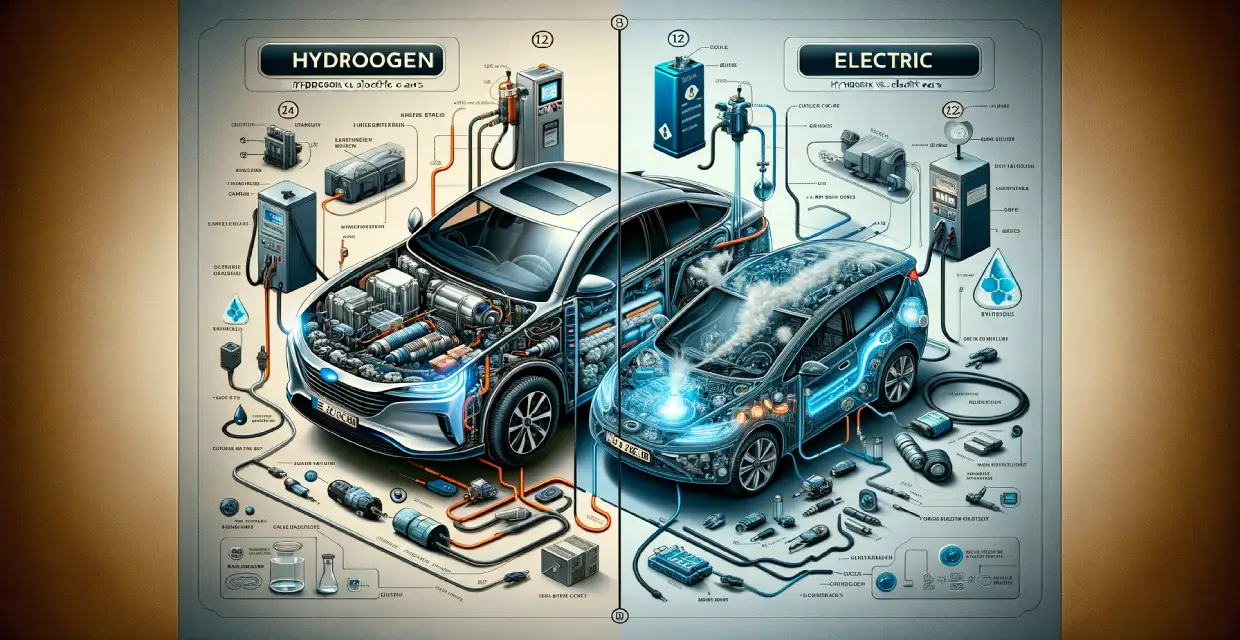
Hydrogen vs. Electric Cars: Powering the Future of Mobility

Hydrogen vs. Electric Cars: Powering the Future of Mobility
Auto enthusiasts consider the new hydrogen cars the best mobility alternative to traditional gasoline-powered vehicles. Internal combustion vehicles are about to become extinct in the future. What will lie ahead are the electric cars of hydrogen-fueled cars. EVs, which are also known as fuel-cell electric cars, are already popular on Indian roads. This article will help you get the basics, working, pros and cons of hydrogen and electric cars.
Electric Vehicles (EVs): Electric Vehicles operate on electric fuel cells. Since the fuel is not carbon-based, these vehicles offer cleaner and emission-free drives. An electric motor is responsible for moving the car ahead, which in turn, is powered by rechargeable batteries. Electric cars run silently since there is no combustion involved. Electric cars are also relatively cheap, and as the trend is increasing, the Indian Market is seeing a lot of these. Electric cars use state-of-the-art technology to improve and sustain performance. Since they are powered by electric current, which makes electric vehicles a little less risky when it comes to fuel and handling.
Also Read:- Electric Car vs Petrol Cars
Hydrogen Fuel Cell Vehicles (FCVs): Hydrogen Cars use hydrogen to fill up a single fuel tank. Hydrogen-powered vehicles (or cars) are termed FCVs in the auto world. Hydrogen-powered cars are more expensive than electric ones. The chemical reaction causes the hydrogen to react with oxygen, inside the fuel cells, generating energy to drive the car. Hydrogen tanks act as storage and since water is the only by-product, it makes hydrogen cars greener than electric cars.
EV Infrastructure: Electric Cars, unlike petrol or diesel cars, use electricity to run the motors. To charge an electric vehicle battery, electric charging stations are present across highways and cities to make it a convenient drive.
Also Read:- What are Hydrogen Car?
Hydrogen Infrastructure: Running on hydrogen power, Hydrogen Fuel stations are relatively less available at present times. Cheaper and better ways to produce hydrogen gas and use it for commercial purposes will be a way out of this.
Driving Range: Battery-cell electric vehicles have a typically lesser range than Hydrogen Fuel Cell Vehicles. The cars that use hydrogen fuel cell technology, are having ranges similar to the traditional gas-powered cars.
Refuelling Time: With current technology, the fuel tanks of hydrogen-powered cars tend to fill even faster than petrol and diesel cars. While the infrastructure for electric cars is available easily, they take much higher times compared to the time taken to pump the high-pressure hydrogen gas into the tank.
Also Read:- Upcoming Petrol Cars in India
Charging infrastructure is more developed.
Zero tailpipe emissions contribute to cleaner air.
Evolving battery technology enhances range and performance.
Limited driving range compared to hydrogen cars.
Longer charging times can be inconvenient during long trips.
Dependency on the electricity grid for charging.
Rapid refuelling is similar to traditional gasoline cars.
Extended driving ranges make them ideal for long travels.
Zero emissions, emitting only water vapour.
Scarcity of hydrogen refuelling stations.
Production and storage of hydrogen are energy-intensive.
Higher costs due to limited infrastructure and technology.
Hydrogen Fuel cell cars came on the roads for the masses during 2014. Toyota was the first in this race and till 2022, it has seen a tremendous jump in the sale and efficiency of its Hydrogen Cars. BMW is also not lagging when it comes to Hydrogen cars. The BMW iX5 Hydrogen fleet is what BMW pitches as their drive for the future.
Also Read:- Types of Car Engines
The car manufacturers, having mastered car innovation, should be the ones in the Luxury segment to look out for. Hyundai and Honda are also establishing their roots in this segment. Between 2017-2021, these car manufacturers sold more than 14 million cars in the segment. Both Honda and Hyundai are aiming for the best out of 2024, with plug-in charging and hydrogen technology combined and presented in a single car. It must be noted that the Indian Car Market is still untouched by these cars.
Electric Vehicles have established themselves a lot more than Hydrogen Cars. Almost all the popular car manufacturers in the Indian Car Market have launched their Electric Vehicles. Hearing about the possibility of Tesla hitting the Indian Roads will be a game changer. Tata Nexon -EV is said to be the most popular car in terms of Electric Vehicles. They are being adopted judiciously by the consumer and are on their way to replacing the traditional fuel-powered vehicles,
Hydrogen-powered cars are not cheap and hydrogen vehicles lack the required infrastructure to sustain everywhere. This makes driving hydrogen vehicles a little less convenient during the present times. Electric cars don't have such limitations and are becoming increasingly popular day by day. These cars offer greener drives and are relatively cheaper.
Powered by batteries, electric vehicles are tending to prove more beneficial to the consumer. With technological advancements, the cost of hydrogen fuel will eventually go down, making both electric and hydrogen cars work towards a cleaner and greener future.